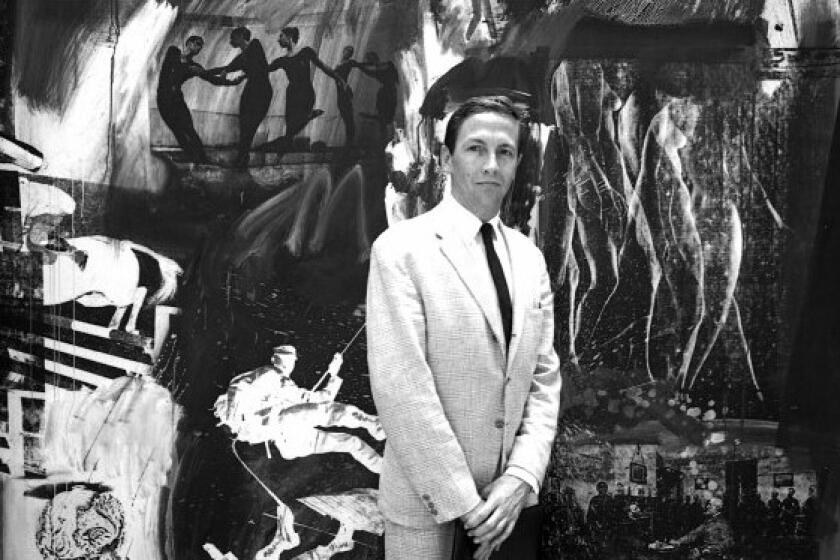THEATER NOTES : The Oscars Started Small Too
As the first winner to accept one of the new, competitive Ovation Awards Mon day night, Marga Gomez (“Carpa Clash”) told the 1,250 assembled at the Alex Theatre: “I feel like Janet Gaynor.”
She was referring to the winner of the first best actress Oscar, presented in 1929. That was before the Oscars were seen worldwide, of course; Gaynor later recalled that the ceremony “was more like a private party.”
The Ovation ceremony was open to the public, but it too resembled a private party. Loud cheers and whoops erupted from corners of the hall at the mention of certain nominees, signaling that a lot of theater people were there to support friends and colleagues.
In scripted remarks before presenting an award, director Allan Miller observed that “in Russia, the actors applaud the audience,” to which Rue McClanahan snapped back, “In L.A., the actors are the audience.”
Nevertheless, Ovations sponsors eventually hope their annual ceremony will be famous among a much larger audience. The primary purpose of it is public relations--to spread the word about the size and depth of the L.A. theater scene.
Emcee Mariette Hartley picked up a phrase that seems to have become a mantra among Ovations officials--L.A. can boast of “more shows on more stages than any other city at any time, anywhere on the planet.” (The number of shows on Mars has yet to be confirmed.)
L.A. offers more than just quantity, she added, pointing out the recent Pulitzers for shows that passed through Los Angeles before going to New York.
Indeed, the evening’s biggest winner, “Sunset Boulevard,” just opened in New York, after it found its footing in its Shubert Theatre run here.
Everyone assumed the “Sunset” winners were all in New York Monday. So by the time Joyce Van Patten announced that John Napier, who designed “Sunset,” had won an award, she simply said “We know where he is” and started to walk off the stage with his trophy. But then Napier rose from the audience, exclaiming “I’m here!” With his trophy finally in hand, he announced that he’s moving to L.A., and “it’s comforting to know there may be some work here for me.”
“Sunset” hardly took all the honors. Among the evening’s biggest surprises was that Tracy Young, director of the Actors’ Gang’s “Hysteria,” won the director/musical award over such competition as Trevor Nunn of “Sunset” and James Lapine of “Falsettos.”
The best play awards to “Fool Moon” (larger theaters) and “Men on the Verge of a His-panic Breakdown” (smaller) prompted a bit of post-ceremony grumbling that these were not real plays, but rather revues or performance pieces. Even “Men” playwright Guillermo Reyes, accepting his Ovation, referred to his show as “these monologues.” Of course, the definition of “play” is not very precise.
It would have been interesting to see how the winning plays would have fared if South Coast Repertory and the Cast Theatre--two theaters whose productions have won many of the recent playwriting awards from critics’ groups--were among the competitors. They don’t belong to Theatre LA, so their shows aren’t eligible for Ovations.
*
AT THE LOBERO: West End Artists Theatre Company, formerly based at the West End Theatre in Van Nuys, has announced a season of shows at Santa Barbara’s Lobero Theatre: Michael Kavanagh’s solo performance “Bein’ With Behan” (Jan. 28-Feb. 12), Michael Valenti’s Off Broadway musical “Lovesong” (Feb. 25-March 4), Gene Castle’s new musical “Tin Pan Alley” (June 30-July 14) and a revival of West End’s production of the musical revue “Broadway Sings Out!” (Dec. 9-16, 1995).
The company presented “Crazy Words, Crazy Tunes” at the Lobero last summer, in the wake of the untimely departure of Pasadena-based Theatre Corp. of America, which left a number of Santa Barbara subscribers grumbling about their unfinished subscriptions. Although West End has nothing to do with Theatre Corp., West End will offer a discount to the Theatre Corp.’s Lobero subscribers (available only until Dec. 1) in recognition of the fact that they otherwise might be leery of subscribing to another Lobero series.
More to Read
The biggest entertainment stories
Get our big stories about Hollywood, film, television, music, arts, culture and more right in your inbox as soon as they publish.
You may occasionally receive promotional content from the Los Angeles Times.






